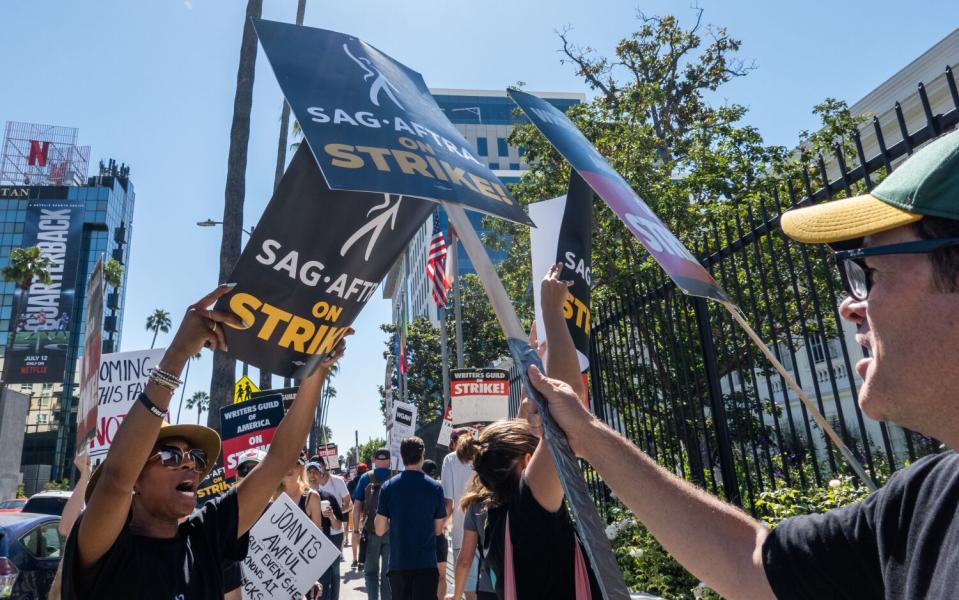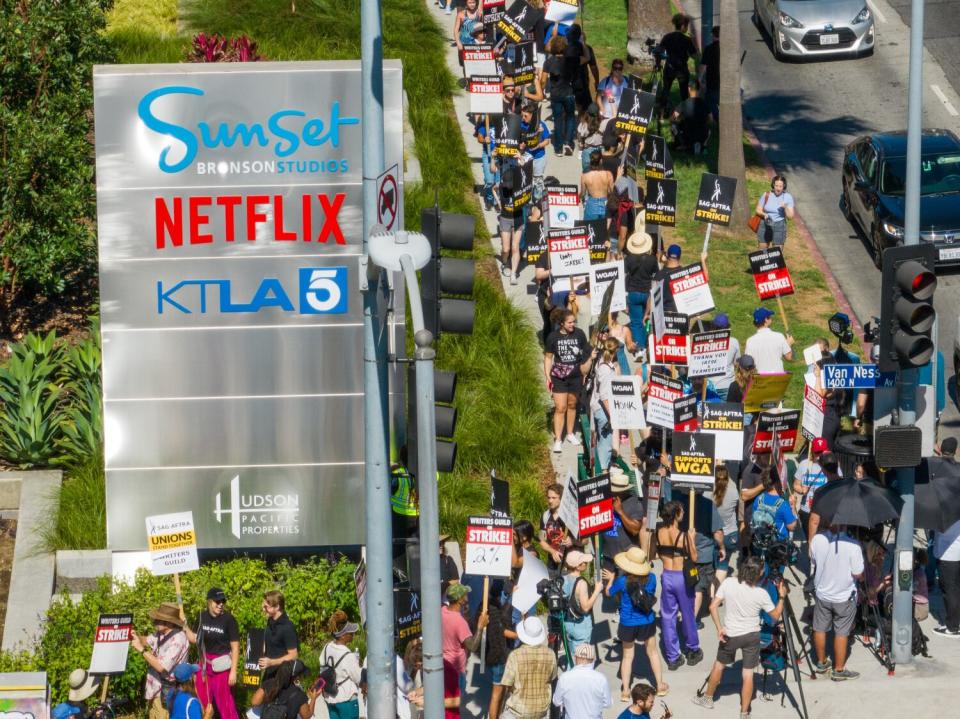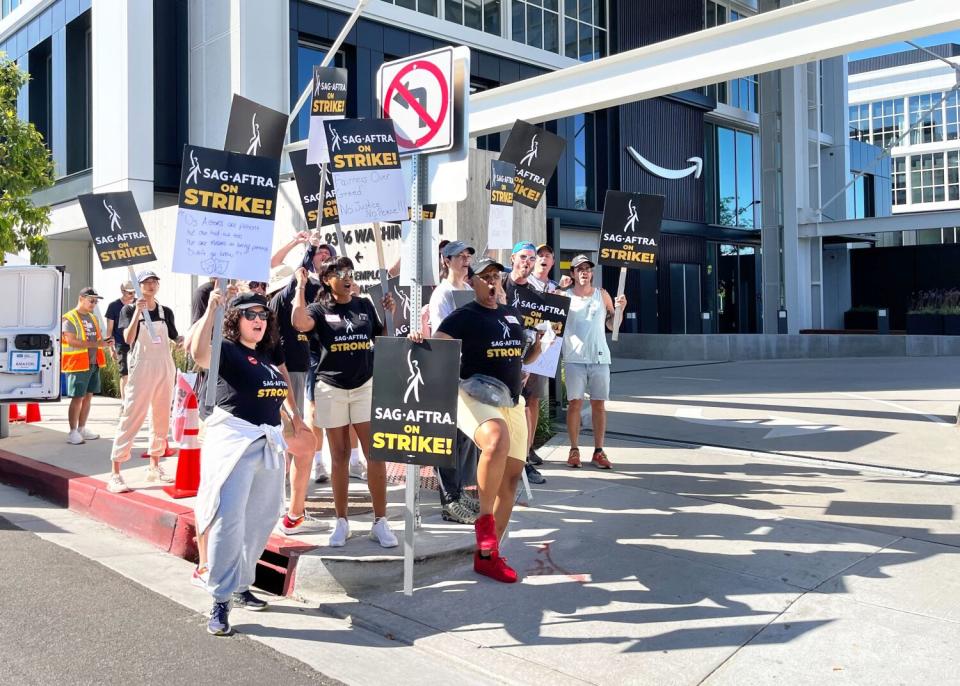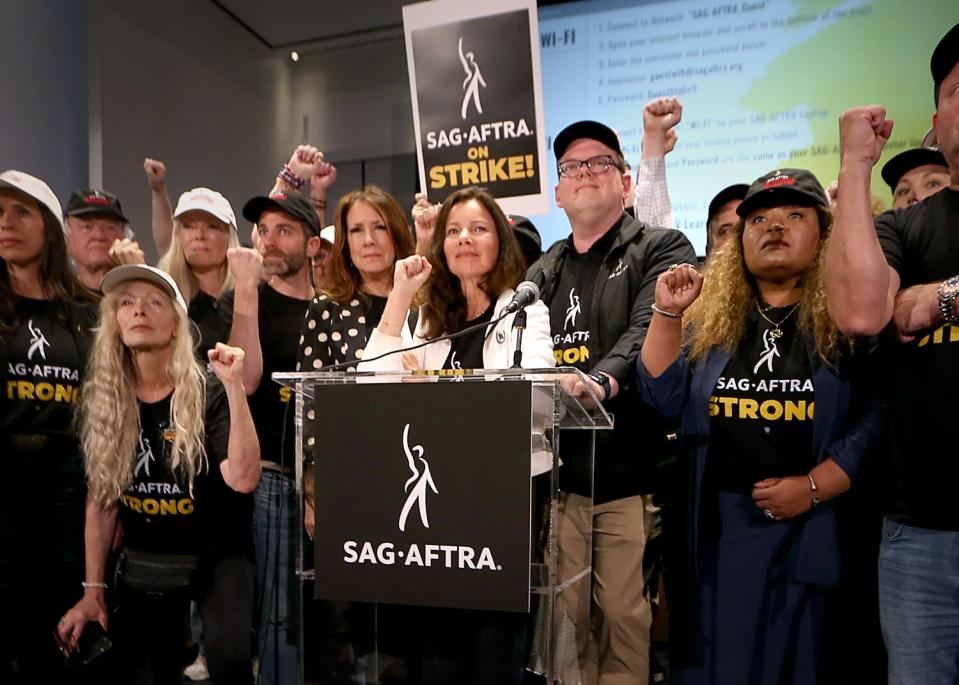Hollywood actors join WGA in historic double strike. 'This is all of our fight'
Dramatically escalating a bitter labor battle that has already brought Hollywood to a virtual standstill, thousands of striking film and television actors took to the streets Friday to fight for better pay and job protections in an industry that has been upended by the rise of streaming.
On picket lines outside more than a dozen studios and production facilities in Los Angeles and New York, including the Warner Bros., Walt Disney and Sony lots as well as the headquarters of Netflix and Amazon Studios, actors held aloft signs and chanted in unison alongside Writers Guild of America members who walked off the job in May.
As temperatures rose throughout the morning in Los Angeles, so did the number of picketers from SAG-AFTRA, the actors' union.
Coming on the heels of walkouts by graduate students, L.A. Unified School District workers and hotel employees, Hollywood’s double strike is adding further heat to what some are already calling “hot labor summer.”
Sonja Roden, 50, who has appeared as a background actor on shows such as “Westworld” and “Castle," was among those who gathered outside the Disney lot in Burbank. While the union's starry A-listers often grab the spotlight, Roden emphasized that the majority of her fellow SAG-AFTRA members are just trying to make a living wage.
“A lot of people don't realize that the people who make the millions are a very small percentage of the actors in the industry," she said. "The rest of us are literally living paycheck to paycheck. And we need to be paid fairly. We're working sometimes 10- to 16-hour days and barely making minimum wage."


The SAG-AFTRA work stoppage began at midnight after weeks of negotiations with the Alliance of Motion Picture and Television Producers, which represents the major studios and streamers, failed to yield an agreement on a new contract.
The labor action marks the first time actors have gone on strike against the film and television studios in 43 years. The industry has not seen a joint strike by actors and writers since 1960, when Ronald Reagan was leading the Screen Actors Guild and a different disruptive technology — television — was at the heart of the dispute. (SAG merged with AFTRA in 2012.)
The protests represent a show of strength on behalf of SAG-AFTRA’s 160,000 members, as they push the AMPTP to address what they describe as the erosion of their livelihoods caused by Hollywood’s shift toward streaming. Actors in June voted 98% in favor of a strike authorization.
Like writers, actors have seen their pay decrease because of shrinking residuals, shorter TV seasons and longer hiatuses. Actors also have raised concerns about the prospect of studios and streamers using their likenesses without their consent thanks to rapid advances in AI.
Read more: What to know about the SAG-AFTRA actors' strike
Studios and streamers have countered that they are facing their own financial head winds, as the film business struggles to return to its pre-pandemic health and TV viewers continue to drift away from network and cable programming toward streaming and other digital distractions, shrinking profit margins, dampening share prices and forcing widespread layoffs.
In an interview with CNBC on Thursday, Disney Chief Executive Bob Iger called the actors' demands unrealistic and ill-timed. "We’ve talked about disruptive forces on this business and all the challenges that we’re facing and the recovery from COVID — which is ongoing, it’s not completely back," Iger said. "This is the worst time in the world to add to that disruption.” (Outside the Disney lot, one striking SAG member hoisted a sign depicting Iger as Marie Antoinette that read, "How about sharing some of that cake, Bob?")

In a statement released Thursday, the AMPTP touted the offer the group had made to actors, including what it said was the highest percentage increase in pay minimums in 35 years and a "groundbreaking" proposal for AI protections. "A strike is certainly not the outcome we hoped for as studios cannot operate without the performers that bring our TV shows and films to life," the AMPTP said. "The union has regrettably chosen a path that will lead to financial hardship for countless thousands of people who depend on the industry."
Picketing outside Sony Pictures Studios in Culver City, Brian Konowal, who has been a character actor for 30 years and has a recurring role on the Paramount+ Western series "1923," said the shift to a streaming business model has hurt performers like him.
"There are shows that are streaming globally 24 hours a day, and no one wants to reveal the metrics and compensate people for what they’re worth, whether they’re actors or writers," Konowal said. "There’s just a big squeeze on the middle. Whether you are a guest actor or give five lines, we’re all supporting the bigger actors, and it's just gotten harder and harder."
Brad Greenquist, 63, who has been in the union since 1985, picketed outside Netflix's headquarters alongside his son Sebastian Schier, 25, who recently appeared in the final episode of the Hulu series "Tiny Beautiful Things" and works in a restaurant to make ends meet.
Greenquist said he worries about the future for those like his son who are just starting out in the business.
“What I am concerned about with the younger generation is that they don’t know what it was and therefore their expectations are lower,” he said. In the past, "you could do three guest star roles a year and make a really good living. Now good luck with that. You have to have seven or eight guest star roles a year."
At a news conference Thursday announcing the strike, SAG-AFTRA President Fran Drescher delivered a fiery speech that channeled such frustrations, shaking her fist as she blasted what she regards as the greed of the studios and streamers. “I am shocked by the way the people that we have been in business with are treating us,” said Drescher, who rose to fame on the 1990s sitcom "The Nanny." “It is disgusting. Shame on them.”
Read more: Writers' strike: What's at stake and how it could disrupt Hollywood
Actor Brian D. Mason, 38, who recently appeared on an episode of the Amazon series “Bosch,” said hearing Drescher's speech compelled him to come out.
"It made me emotional — it was so passionate and so real, “ said Mason, who joined the Sony picket line. "There’s been so much happening in the past few years. It’s easy to remove yourself from the hard issues, but they’re here and it’s not going to change unless we do something and take a stand. Artists need to be paid. We need to be appreciated."
Outside the Warner Bros. lot in Burbank, former "Beverly Hills, 90210" star Gabrielle Carteris, who served as SAG-AFTRA president from 2016 to 2021, praised her successor's impassioned rallying cry.
“Fran was right on the mark,” Carteris said. “She really showed that we actually have a meaningful reason to be here right now. I also think she made it really relevant to all workers; we're being threatened here and challenged, not just in terms of squeezing our wages, but the idea of AI, which will absolutely affect all of us. This is all of our fight.”

Like many striking actors, Thomas Ryan Best, 46, who has worked as a background actor on the HBO comedy “Barry," said he was worried about studios scanning actors' faces in order to use their likenesses in perpetuity with AI.
“I saw that happening on sets two to three years ago," Best said. "I never did it. I always shrink away whenever a [production assistant] or someone tried to grab me for that, but there’s only so much you can do as a person with no pull."
The AMPTP has disputed SAG-AFTRA’s characterization of studios’ and streamers’ stance toward AI, saying its offer to the actors’ union “protects performers’ digital likenesses, including a requirement for performer’s consent for the creation and use of digital replicas or for digital alterations of a performance.”
Kirstiana Bleu Rosas, 31, picketed outside Amazon Studios' headquarters in Culver City as her 6-month-old son slept in a stroller. The Actors' Equity member, who has done professional theater, short films and background work, is hoping to join SAG-AFTRA but says that lack of work and unfair pay are stalling those plans.
“I think it’s really important to show everyone watching around the world the solidarity that we have,” she said. “This is what I consider a pivotal moment in the industry, and I feel it is my moral duty to be here.”
With production on the vast majority of scripted content now halted, a protracted shutdown is certain to cause further economic pain throughout the industry and the wider Los Angeles economy, hurting not only those who work directly in film and TV but also the many others who help service the entertainment industry, including drivers, dry cleaners and caterers.
In a statement Friday, L.A. Mayor Karen Bass urged a swift resolution to the strike, writing, "It is clear the entertainment industry is at an inflection point. This affects all of us and is essential to our overall economy. I call upon all sides to come to the table and work around the clock until an equitable agreement is reached."
Read more: As actors go on strike, these films and TV shows are likely to shut down
Speaking to reporters outside Netflix headquarters, Drescher said the union is prepared to dig in for as long as it takes to get a fair deal and will leverage the star power of some of its members to garner public support.
"We're going to galvanize high-profile people and sharpen our expertise in some of the areas that are bones of contention," Drescher said. "And we are going to wait until our opposition decides to come and negotiate with us. But that has not been the case."
Walking the picket line outside Amazon Studios, Aaron Rahsaan Thomas, co-creator of CBS’ “S.W.A.T.,” said that, more than two months into the writers' strike, he and his fellow WGA members welcome the addition of SAG-AFTRA to the fight.
“We have an opportunity to be stronger together than we are apart,” he said. “You have artists who normally collaborate in different ways now trying to collaborate on this front, trying to get what’s right and what’s just. And actors are a fun bunch. You have a group of introverts and you have a group of extroverts, and that’s always a good mix.”
Times staff writers Stacy Perman, Anousha Sakoui, Jonah Valdez, Yvonne Villarreal, Julia Wick, Jen Yamato and Miykael Stith contributed to this report.
This story originally appeared in Los Angeles Times.

